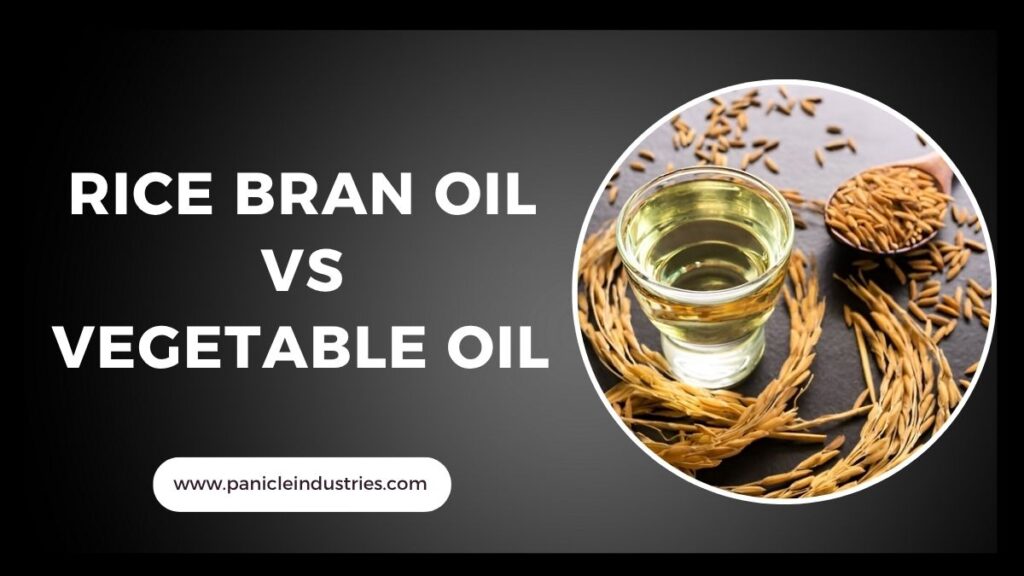When choosing the right oil for cooking, it’s important to know what you are putting into your food. Two common choices in Indian and global kitchens are rice bran oil and vegetable oil. Many people wonder which one is better for health, cooking, and overall lifestyle.
In this blog, we will talk about rice bran oil vs vegetable oil in simple and clear language. We will compare them based on their source, nutrition, benefits, cooking uses, and more. If you are looking to make a better choice for your cooking oil, this blog will help you understand both options and decide what fits best for you and your family.
What Is Rice Bran Oil?
Rice bran oil is extracted from the outer layer (bran) of rice grains. This oil is known for its light texture, neutral taste, and high smoke point. It contains a unique antioxidant called oryzanol, which is helpful for heart health. It is rich in monounsaturated fats (good fats) and is often recommended by health professionals.
Rice bran oil is also rich in Vitamin E, which is good for the skin, and has anti-inflammatory properties. It is popular in Asian countries, especially in India and Japan, and is becoming more common worldwide due to its health benefits.
What Is Vegetable Oil?
Vegetable oil is a general term used for oils that come from various plant sources like soybean, sunflower, corn, or palm. These oils are usually blended and refined for cooking use. Most vegetable oils are cheap and easily available in markets. They have a mild flavor and can be used for frying, sautéing, baking, and other cooking methods.
However, vegetable oil can sometimes be high in omega-6 fatty acids, which, if consumed in excess, may lead to inflammation. Also, some vegetable oils go through a heavy refining process, which reduces their natural nutrients.
Also read: Rice Bran Oil vs Avocado Oil
Rice Bran Oil vs Vegetable Oil
Rice Bran Oil vs Vegetable Oil: Source
- Rice Bran Oil comes specifically from rice husk (the bran layer).
- Vegetable Oil can be made from different plants — such as soybean, sunflower, or corn — and is often a mixture.
This means rice bran oil has a single source and is more consistent in quality, while vegetable oil may vary depending on the blend used by manufacturers.
Rice Bran Oil vs Vegetable Oil: Nutritional Value
Rice Bran Oil:
- Rich in monounsaturated fats (good fats).
- Contains oryzanol — an antioxidant.
- High in Vitamin E.
- Lowers LDL (bad) cholesterol.
- Has anti-inflammatory properties.
Vegetable Oil:
- Varies depending on the type used (soybean, sunflower, etc.).
- Often high in omega-6 fats.
- Contains polyunsaturated fats.
- May be low in natural nutrients after refining.
If we compare the two, rice bran oil offers better nutritional value with heart-healthy fats and natural antioxidants.
Health Benefits: Rice Bran Oil vs Vegetable Oil
Health Benefits of Rice Bran Oil:
- Helps reduce bad cholesterol levels.
- Supports heart health.
- Boosts skin and hair health due to Vitamin E.
- Light and easy to digest.
- May reduce inflammation in the body.
Health Risks of Vegetable Oil (when overused):
- Too much omega-6 can lead to inflammation.
- Over-refined oils may lack nutrients.
- Some oils may contain harmful trans fats.
So, in terms of health, rice bran oil is a safer and healthier option, especially for people concerned with heart diseases and cholesterol.
Cooking Use: Rice Bran Oil vs Vegetable Oil
Rice Bran Oil:
- Has a high smoke point (232°C).
- Perfect for deep frying, stir-frying, and sautéing.
- Does not affect the taste of the food much.
- Keeps food light and non-greasy.
Vegetable Oil:
- Also good for frying, baking, and cooking.
- Smoke point depends on the type of oil.
- May leave food slightly greasy if overused.
In cooking, both oils perform well. However, rice bran oil wins when it comes to lightness, neutral flavor, and high smoke point.
Affordability and Availability
Rice Bran Oil:
- Slightly more expensive than regular vegetable oil.
- Widely available in supermarkets and online.
- Often promoted as a premium healthy oil.
Vegetable Oil:
- Generally cheaper.
- Easily available in every grocery store.
- Popular in restaurants and homes due to its low price.
For budget-conscious buyers, vegetable oil is more affordable, but for health-conscious families, rice bran oil is worth the price.
Which Oil Is Better for Daily Use?
If you are cooking every day for your family, your choice of oil matters a lot.
- Choose rice bran oil if:
- You want a heart-friendly oil.
- You are concerned about cholesterol.
- You prefer cooking that keeps food non-greasy.
- You are willing to spend a little more for better health.
- Choose vegetable oil if:
- You have a tight budget.
- You do not have special dietary concerns.
- You use oil in large amounts (e.g., for big families or commercial cooking).
Still, it’s always good to rotate your oils. Using different healthy oils throughout the month ensures a balance of nutrients.
Expert Opinions
Most nutritionists and health experts recommend switching from refined oils to healthier options like rice bran oil, olive oil, or mustard oil. They agree that rice bran oil provides antioxidants and heart protection, which are missing in most vegetable oils.
Doctors often advise people with heart issues or high cholesterol to switch to rice bran oil. However, they also suggest using oils in moderation, no matter which one you choose.
Environmental Impact
Rice bran oil is a byproduct of rice milling, so it makes good use of something that would otherwise be wasted. This makes it an eco-friendly choice. On the other hand, vegetable oils like palm oil are sometimes linked to deforestation and environmental damage.
Choosing rice bran oil can be a small but meaningful step toward sustainable living.
Conclusion
Both rice bran oil and vegetable oil have their uses and advantages. But if we compare them closely, rice bran oil stands out for its health benefits, higher nutritional value, and cooking performance. While vegetable oil is cheaper and commonly used, it may not offer the same level of health support. If you are thinking about long-term health, heart safety, and light cooking, rice bran oil is a better choice. The keyword “rice bran oil vs vegetable oil” is important because more people today are becoming aware of healthy cooking options. Make informed choices, and your meals will not only taste good but also support your well-being.


